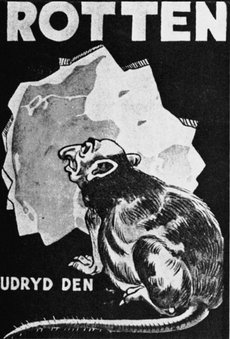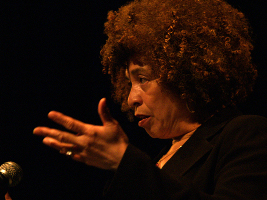Veganism and Intersectionality
Recently it was posited to me that veganism can not be an intersectional movement because it would require us to view oppressed humans as sub-human. The person further went on to point out that historically, minorities have been denigrated through comparison to nonhuman animals. This last statement is true — it can be seen from the way that Jews were treated in Nazi Germany to the way that African Americans are still treated in the USA to day.

There are, however, a few things wrong with this argument. Firstly, intersectionality focuses on the systems of oppression, not necessarily on the victims of oppression. Therefore, the victims of oppression do not have to have anything in common for there to be similarities in the way that they are being oppressed.
However, that still misses the larger issue here, which is the inherent speciesism of the idea that nonhuman animals are somehow “lesser creatures”. In a sense, it is this pre-conditioned belief, a belief that most humans share, that makes the comparison between oppressed groups and nonhuman animals so upsetting. Aside from the obvious issue of the oppression of a group of humans, should we not also question the societally conditioned belief that humans are somehow “above” or “better than” nonhuman animals?
How do we rank animals? Dolphins are better swimmers than us. Cheetahs are faster runners. Cows are stronger than us. Birds can fly. We are good at many things, mostly at pattern recognition, understanding our world and building on that knowledge. Our all-too-often flawed perception of intelligence generally appears to steer our species towards a biased moral hierarchy (not just for nonhuman animals, but within human populations, eg. the now-debunked pseudoscience of phrenology).
The same person went on to write: “Bottom line, if you think animal life is as valuable as human life… and think eating chickens is just as bad as cops gunning down black and native people, then yes you are a white supremacist.”
Of course, this ludicrous and inflammatory statement is a logical fallacy, tantamount to “if you show compassion for refugees, you must hate homeless people”. The fact is that it is quite possible to hold both actions as abhorrent, without having to assign some “hierarchy of bad” to them. In a hypothetical scenario, where you have to choose between saving a family member over a stranger, or a stranger over an animal, one would make a choice between two morally problematic options (ah, but what if the human was a racist pedophile and the animal was your family pet? What if the family member was in the late stages of a terminal disease and the stranger was a child destined to be the next Gandhi?). In everyday life, however, most westerners are incredibly fortunate not to face such moral dilemmas, and general consensus is that murder goes into the moral Wrong Box; to entertain such what-ifs are unnecessary and unproductive. (for starters, see: “The Dog in the Lifeboat: An Exchange” by Tom Regan and Peter Singer, “Introduction to Animal Rights: Your Child or the Dog?” and “Comparable Harm and Equal Inherent Value: The Problem of Dog in the Lifeboat” by Gary L. Francione)
But the beauty is that while we seek to address our own privilege with regards to race, and while we strive to be good allies and to stand alongside other marginalized humans to support them in their fights for justice, we can also seek to address our own privilege with regards to species. We can embrace veganism, not in the modern “don’t eat animals” watered down meaning of the word, but as it was originally meant, to seek to break down unjustified hierarchy and recognize that nonhuman animals value their lives as much as we value ours. To give nonhuman animals moral consideration when we are making decisions that affect them, such as (but not limited to) what to eat, what to wear, and what entertains us.

To quote Angela Davis: “I think it’s the right moment to talk about it because it is part of a revolutionary perspective – how can we not only discover more compassionate relations with human beings but how can we develop compassionate relations with the other creatures with whom we share this planet…”
Resources
For more information on the subject of intersectionality and veganism, you may enjoy these websites and books:
- The Sexual Politics of Meat
- Carol J. Adam’s Blog
- The Sistah Vegan Project
- The Food Empowerment Project
- Vegans of Color
- Circles of Compassion: Essays Connecting Issues of Justice
- The Vegan Feminist Network
- Striving with Systems
- Abolitionist Vegan Society
- The Academic Abolitionist Vegan
- A Rational Approach to Animal Rights: Extensions in Abolitionist Theory
Special thanks to Julie A. for editorial and moral support.